|
|
|
Sort Order |
|
|
|
Items / Page
|
|
|
|
|
|
|
| Srl | Item |
| 1 |
ID:
143035
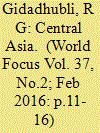

|
|
|
|
|
| Summary/Abstract |
Declaration by ISIS that the Central Asian States (CAS) will be one of the targets has been a matter of great concern not only for these concerned countries but also for those which are closely politically and economically linked with Central Asia. Hence several questions arise. Why are the CAS targets of the ISIS and what are the problems facing the CAS due to this declaration by the ISIS? What policy measures are taken by the state authorities of the CAS to deal with this situation? What are the perspectives and challenges?
|
|
|
|
|
|
|
|
|
|
|
|
|
|
|
|
| 2 |
ID:
135501
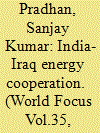

|
|
|
|
|
| Summary/Abstract |
Iraq is a nation in crisis and burdened with the long history of war, internal power struggles, failed governance, sectarian violence (Shia and Sunni) and ethnic divisions between Arab and Kurds. The ISIL (ISIS) upsurge is the most recent outburst of longstanding issues in the region and has affected socio-economic fabrics, political system and stability of the country. Baghdad’s major source of revenue, petroleum and natural gas, to which the world community looks for, is affected by ISIL aggression today. Hence, a sense of insecurity and uncertainty looms large in the international energy market for the future trade on energy.
|
|
|
|
|
|
|
|
|
|
|
|
|
|
|
|
| 3 |
ID:
167683
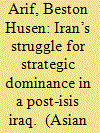

|
|
|
|
|
| Summary/Abstract |
Iran's influence and presence in Iraq have increased significantly in recent years. The collapse of the Saddam's dictatorship in 2003, after the US invasion, served to inflate Iran's influence in Iraq, particularly in the post-ISIS era. In this connection, Iran has used various means and tools to develop its strategy in Iraq. This article argues that Iran's current strategy in Iraq stems from a Realpolitik agenda rather than an ideological one, concerned more with political, economic, and security interests than pursuing revolutionary objectives per se. To this end, Tehran has largely relied on long-established relationships with several pro-Iranian political parties and militia groups. These relationships are often couched in religious ideological terms as a foundation and justification for its future strategy in post-ISIS Iraq. The questions that this paper will address are the following: what was Iran's role in defeating ISIS in Iraq? How has Tehran benefitted from its long-term relationships with Iraqi political parties and militia groups? What are the Iranian sources of power in Iraq and how do they help Iran gain strategic dominance in Iraq?
|
|
|
|
|
|
|
|
|
|
|
|
|
|
|
|
| 4 |
ID:
143040
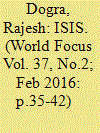

|
|
|
|
|
| Summary/Abstract |
The actions of ISIS in the past few years have left the whole international community to stare feared with awe. The pace with which ISIS is expanding and the number of victims that leaves behind, has caused severe alert to all international organizations and States. The problems of the funding of ISIS, the support from other terrorist groups, the internet propaganda and the foreign terrorist fighters are phenomena that are still hard to be 100% traced and solved.
|
|
|
|
|
|
|
|
|
|
|
|
|
|
|
|
| 5 |
ID:
181013
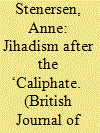

|
|
|
|
|
| Summary/Abstract |
The rise of the Islamic State in Iraq and Syria, and its subsequent split with al-Qaida in 2014, revealed there is still much we do not know about jihadism. Existing typologies of Islamism describe jihadism as a unitary phenomenon, characterized by a preference for violence over other methods for political change. This article presents a more fine-grained typology of jihadism that captures the core divisionary issues within the jihadist current. It argues that jihadist groups can be classified along two scales: the ‘takfirism’ scale defines how the group relates to society, and it runs from integration at one end, to separation on the other. The ‘pan-Islamism’ scale defines what the group fights for, and it runs from ethnic homeland on one end to umma on the other. The main argument is that jihadist groups ensure their survival by shifting their position along the scales—either by becoming less takfiri or more pan-Islamist. The article thus challenges the general notion that ‘terrorism always ends’. Only certain types of jihadists will end, while others—such as al-Qaida and Islamic State—may survive indefinitely.
|
|
|
|
|
|
|
|
|
|
|
|
|
|
|
|
| 6 |
ID:
143055
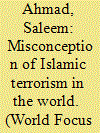

|
|
|
|
|
| Summary/Abstract |
In international politics, issues are created and suppressed according to their interests like Al-Qaida and now Islamic terrorism has become one of the big terrible issues in international politics. Consequently, the issue of Islamic terrorism is serving the interests of Da’esh as well as western countries and this war will be continued in future.
|
|
|
|
|
|
|
|
|
|
|
|
|
|
|
|
| 7 |
ID:
143037
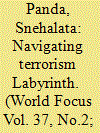

|
|
|
|
|
| Summary/Abstract |
Terrorism can be understood by Action -Reaction Syndrome .Deep rooted causes shape the mindset of the terrorist for indulging in violent action .It is the manifestation of careful preparation seeded with consciously selected targets .More often than not the response from government follows extremely devastating action. As the terrorist groups have dissimilar reasons at different times and in different locations the response may not be successful by the government /the ultimate target. It is not occurrence but recurrence in different situations by different groups whose motivations and methods do not follow a uniform pattern.
|
|
|
|
|
|
|
|
|
|
|
|
|
|
|
|
| 8 |
ID:
155266
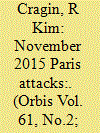

|
|
|
|
|
| Summary/Abstract |
This article provides an in-depth analysis of the role of foreign fighter returnees in the attacks by the Islamic State in Iraq and Syria (ISIS) in Western Europe. To do this, it focuses primarily on the operatives and logisticians responsible for the November 2015 attacks in Paris. The threat from foreign fighter returnees remains under-appreciated in expert and policymaking communities. ISIS’s rhetorical emphasis on the caliphate, combined with a series of attacks by lone actors, has made it easy for policymakers to misinterpret ISIS’s true intentions against the West. This case study illustrates that ISIS leaders have been able to plan and execute parallel strategies within the Middle East (Islamic caliphate) and Western Europe (terrorist campaign). Moreover, they have pursued these parallel strategies through using foreign fighters.
|
|
|
|
|
|
|
|
|
|
|
|
|
|
|
|
| 9 |
ID:
143056
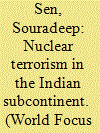

|
|
|
|
|
| Summary/Abstract |
Terrorism is a term with no agreed definition among governments or academicians, but is almost used exclusively in a pejorative sense, to describe life-threatening actions perpetrated by politically motivated self-appointed sub-state groups. A more accurate definition has been proffered by the International Institute for Strategic Studies, London: terrorism is the use of violence, often against people not directly involved in a conflict, by groups operating clandestinely, which generally claim to have high political or religious purposes, and believe that creating a climate of terror will assist attainment of their objectives.
|
|
|
|
|
|
|
|
|
|
|
|
|
|
|
|
| 10 |
ID:
143047
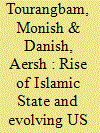

|
|
|
|
|
| Summary/Abstract |
The strategy against the IS is highly dynamic given the rapidly shifting sands of geopolitics in the region and the responses of the countries, including American allies, that have stakes and influence in the region. Given that the election campaign for the presidential seat is heating up in America, the candidates are currently engaged in hyperbolic rhetoric and anti-incumbency criticism that are normal recipes of the campaign season. However, in most likelihood, whoever comes to the White House, will eventually take forward and tie the threads of what President Obama has already been doing and aims to do in his remaining days.
|
|
|
|
|
|
|
|
|
|
|
|
|
|
|
|
| 11 |
ID:
143036
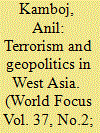

|
|
|
|
|
| Summary/Abstract |
The key to managing the disruptions and assuaging people’s fears is governance. People saw the world fall apart a century ago not because human knowledge stopped advancing, but because of widespread governance and policy failures. As 2016 starts, we must focus on adapting governance, in all of its economic and political dimensions, to the 21st century, so our resources and knowledge produce inclusive progress, not violent conflict.
|
|
|
|
|
|
|
|
|
|
|
|
|
|
|
|
| 12 |
ID:
143033
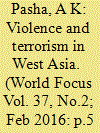

|
|
|
|
|
| Summary/Abstract |
In contemporary West Asia, terrorism normally brings to our attention the mindless violence committed by the Islamic State in Iraq and Syria [ISIS] and elsewhere in the region and beyond. In addition bomb blasts in Tunisia, Egypt, Saudi Arabia, Bahrain, Yemen, Libya, Turkey, and growing violence in Syria and Lebanon remind us of indiscriminate terrorism. Many have condemned terrorist attacks on US and French marines in Lebanon in the early 1980’s when peace keeping forces from these and other countries were stationed in and around Beirut soon after the Israeli invasion of Lebanon in June 1982.
|
|
|
|
|
|
|
|
|
|
|
|
|
|
|
|
| 13 |
ID:
163359


|
|
|
|
|
| Summary/Abstract |
MANY GROUPS ASPIRE TO GOVERN TERRITORY, but few actually followed through with it to the extent that the Islamic State in Iraq and Syria (ISIS) had. In addition to the brutal executions and disfigurements, ISIS also came to be known for fixing potholes, installing power lines, administering polio vaccines, and establishing schools, post offices, roving police forces, food kitchens, and even a consumer protection bureau.
Welfare was an important component of ISIS's “stateness”2 and was widely viewed as a means by which the organization targeted the hearts and minds of the local population. However, not all militias with territorial aspirations provide public goods. Tehrik‐e‐Taliban Pakistan (TTP) is a case in point. The TTP is the largest jihadi group operating in Pakistan, with the ultimate goal of installing a caliphate. While active mainly in a region where state provision of social services is poorest, the TTP has shown little regard for its inhabitants’ welfare. Surprisingly little of the militia's inordinate wealth has been allotted to taking care of the local population. Why do some militias provide welfare while others do not?
|
|
|
|
|
|
|
|
|
|
|
|
|
|
|
|
|
|
|
|
|